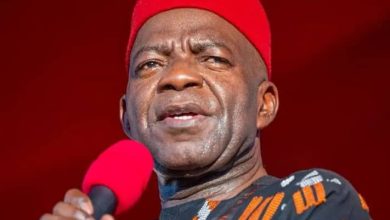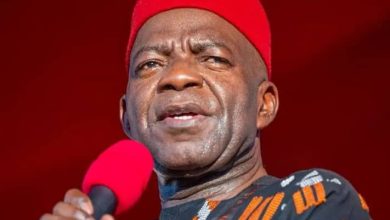Tax Reform Bills: The North Must Modernize Anyhow

By Abdullahi Ismaila Ahmad, Ph.D.
The tax reform bills recently sent to the National Assembly by President Bola Ahmed Tinubu, GCFR, have generated controversies over the past weeks. Many commentators have expressed their views in support of the bills or against some of their provisions.
The Northern Region has expressed vehement objection to the bills. They are against the bills because, in their views, the bills are entirely or partly anti-north. Given most of the observations and the pros and cons of the arguments advanced by the various commentators, it is pertinent to say that whatever views are advanced by the Northern stakeholders, the truth that must be told is that Northern Nigeria must yield itself to the full extent of modernisation, anyhow and soonest.
The tax bills will invariably switch a region like the North out of its encrusted traditional and provincial life patterns.There is no need to regurgitate the controversial issues around the tax reform bills as they are already in the public domain, and much has been said about them thus far.
However, three keywords about the VAT derivation model proposed in the tax bills should form the cornerstone of deliberations and whatever decisions may be taken afterwards by the Northern stakeholders. These signature words are production, consumption, and competition. The Value Added Tax (VAT) is described as a consumption tax. However, before consumption occurs, there must be production, whether in goods or services.
Therefore, production is a key factor in any consideration or discussion of the Value Added Tax. Our rudimentary economic class tells us that factors of production are land, capital, labour, and entrepreneurship, which are the building blocks of any economy. Any society that desires economic progress will not take these factors of production for granted.
Without mincing words, these production factors are abundant in Northern Nigeria, almost to the point of waste. One would expect that the North will have no issue with production, which invariably gives rise to consumption. As an output of the production process, consumption depends on the purchasing parity of a people and their cultural tastes.
Nonetheless, consumption can happen away from the point where goods and services are produced. It is expected, however, that both production and consumption can occur at the same place, thereby enriching the economy of that particular place. This is because trading and commerce will enhance people’s purchasing parity. Without mincing words, Northern Nigeria is essentially a consumption society but with the potential to be a producing economy. It must embrace progressive ideas and modernisation to harness its full economic potential.
This is where competition comes in. There is competition in every aspect of our lives, from the products and services being churned out daily to how societies employ strategies to grow their economies. This makes every society think progressively and forecast the future. No society lays back or indulges in wastefulness or a careless lifestyle and expects to be at par with other societies that have moved on the fast pedestal of development. The pertinent question to ask at this juncture is why Lagos has suddenly become the envy of the entire nineteen northern states. What does Lagos state have that all northern states do not have or cannot have?
The answer to the second question is that Lagos state has painstakingly embraced the full extent of modernisation through its deliberate policy planning and execution, it has embraced technology, industrialization
financial inclusiveness and wealth creation strategies.
Northerners are among those who made Lagos State what it is today with their massive investment there. The point being emphasised here is that the VAT derivation formula being proposed by the tax bills should also be seen as a wake-up call for the Northern stakeholders and political establishment to stir the region out of its slumber and decipher these salient issues dredged up by the bills and quickly embrace the imperative of modernisation.
Modernisation does not mean only the erection of skyscrapers, the construction of flyovers, or paved motorways. Suppose we have all these, by all means, okay. In other words, modernisation refers to a reformation of habits, which W. H. Auden refers to as a ‘change of heart’, which is not simple.
In this regard, modernisation ‘is the reshaping and resharing social values, such as power, respect, rectitudes, affection, well-being skill, and enlightenment’. This is to say that the Northern leadership and political establishment must change its old ways of engaging with the people and the society. It must change its way of perceiving reality to begin to understand that leadership is an instrument for improving the conditions of a people, not a tool for manipulating them.
It must wake up to an understanding that modern life is about competition, progress, and overcoming challenges that improve the condition of a people. It’s not about rhetoric and hyperbole.
The Northern political establishment must develop a mindset that comprehends the reality that governance is about service to the people, building capacities, developing human resources, bettering the living conditions of a people, and challenging the environment to yield its potential for the growth of the society. Indeed, governance should not be approached as a private fiefdom, a personal estate for a wilful distribution of privileges and patronage.
For too long, the Northern political establishment has held down its people in poverty to authenticate its affluence and influence, thereby closing the space for more engaging and productive ideas and wealth creation. That’s why the political class would instead purchase bicycles, coffins, grains, wheelbarrows, and other mundane items purportedly as empowerment when politicians from different regions build their people on ICT and technology pedestals and build food security hubs and other progressive ideas.
The change of attitude required of the Northern political establishment should be the type that will lead to an organisation of economic activities, automation of business transactions, creative development of natural resources, and development of human resources through restructuring of education system and manpower training. W. W. Rostow states that for a society to sustain economic growth by its autonomous operations, ‘it must be effectively geared to the skills and values of the people who make it work’.
That is to say that people’s entrepreneurial skills and values of hard work, industry, and resilience must be sharpened and attuned to the demands of modern life. Small and medium enterprises abound in the North. Still, they require uplifting through capital incentives like access to interest-free loans and other grants and enabling environment such as electricity, potable water supply, access roads to agricultural belts, etc.
For example, through loans and grants, business owners can be encouraged to develop a value chain in their business lines and offer jobs to unemployed youth.
On automation, it’s essential that state governments in the North also recognise the role of technology in business transactions. Globally, technology is being used to drive revenue collection. Today, the record-breaking revenue collected by the FIRS is made possible because of the massive investment in technology allied with administrative finesse.
Therefore, automation of tax payment processes is the norm everywhere. Automation can be done right from the point of business registration, where the data of a business owner can be collected and included in the financial or fiscal process.
Most importantly, this automation option becomes more compelling with the proposed derivation method of sharing VAT. In terms of consumption, it’s unarguable that soft drinks like 7UP, Fanta, Coca-Cola, Mirinda, Sprite, etc, are widely consumed in the remotest part of the North.
In the North, soft drinks equate to the liquor in the South. To be able to appropriate VAT from these drinks and other goods like indomine, pasta, sugar, cement, etc, an automation process needs to be implemented to track how VAT is charged at the wholesale distribution point. This is what is referred to as the output VAT.
Regarding the input VAT, deliberate policy can be made to create a value chain in producing and processing products like rice, yams, vegetables, and fruits. In other words, instead of selling the products in their raw forms, state governments should encourage investors to set up factories to create value chains necessary for generating the required revenue. Given its large population, the North can gain more from the consumption-based VAT method if a deliberate strategy is implemented to optimise the process of output VAT.
There is nowhere in the proposed VAT law explicitly stating that the 60% proposed is entirely and exclusively for Lagos state. The presumption that the VAT proposal will favour only Lagos state is just a figment of the imagination of those peddling the sentiment, which stems from a feeling of inadequacy. The clause says, ‘wherever the consumption of goods and services takes place’ will be given the percentage of the VAT it generates from the earmarked 60% of the overall monthly VAT volume generated.
So, the onus on every state and region is to put its act together to track and authenticate the VAT it generates. Instead of lamenting or expressing the sentiment about Lagos getting the large share of the VAT, it behoves the North to look inward to harness its potential and organise its economic activities. Northern states must wake up to the challenge and stop the lamentations. The North has a population; it has all the factors of production, and it is equally endowed with natural resources to be ahead of other regions. So, why the panic?
Talking about natural resources, there is a concentration of mineral resources in the North like lithium, uranium, talc, limestone, gold, and even black gold and a host of others to make it able to establish companies and industries for the manufacture and production of all kinds of goods and services. And so, the North is not a poor region as it is being iterated; it is just reeling in misplaced priorities and elite complacency.
As it were, if the North had kept to the trajectory of the examples set by Sardauna and Balewa who set up viable business ventures and strategic institutions, built manpower, and laid solid economic framework for the future, all of which have now gone with the winds, it won’t be crying wolf now.
However, what it requires now is the political will and negotiation skills necessary in politics to turn things around for the better. To be sure, politics is about negotiation over scarce resources. Therefore, the sharper your negotiation skills are, your chances of gaining a competitive advantage in a political arrangement will increase.
For instance, what stops the North from negotiating a tax credit scheme to revamp the moribund textile industries in the North? Why did the North allow the Bank of the North to be taken over? Why didn’t the Northern political establishment say anything about the stoppage of the dredging of the River Niger and the abandonment of the Baro Port?
What happened to its cotton potential and the ginnery enterprises? What is it doing with the vast water bodies and arable land? So many questions, indeed. The VAT debacle has provided the North an opportunity for negotiation and introspection. The present atmosphere of regional competition makes the matter even more enjoyable. Therefore, the North must muster every skill to get a better deal out of this debacle and seize this moment to modernise its social and economic institutions for more financial inclusiveness and overall economic growth.
This is a time to change the old habits and embrace progressive ideas. It is instructive how the North raised its voice in unison to object to the Tax Reform Bills. It is equally expedient for the North to rise in unison against the spate of insecurity bedeviling the entire region.
Let the Governors, the Emirs, the Ulamas, and the whole people equally give marching orders to their legislators in the National Assembly, as they did on the tax reform bills, to end the insecurity in the region. Let the North rise against the misplacement of governance priorities and begin to chart the course of modernisation.
As recently suggested by the immediate past Executive Chairman of FIRS, Muhammad Nami, the North must take the issue of financial inclusiveness seriously to be able to move on the same pedestal with the other regions of the country.
There are probably billions of naira circulating in the North outside the banking system because the handlers detest bank interest. Indeed, the North has no other option but to start modernising now. For instance, what stops the Northern stakeholders from using diplomatic instruments to get Middle Eastern banks like Al Rajhi to set up branches in key Northern states’ capitals to attract those outside the banking system to bank their money?
It must be stressed that transactions through the banking system and the embrace of the BVN and NIN, which ensure that everybody is captured in the National Database and the overall fiscal construct of the country, are no longer optional; it should be considered obligatory on everybody, whether young or old, educated or not. Therefore, the North must shift away from the traditional way of doing business and tax collection to a more financially inclusive way to benefit from the VAT windfall.
Abdullahi Ismaila Ahmad, PhD. is the Director, Communications & Liaison Department, Federal Inland Revenue Service





